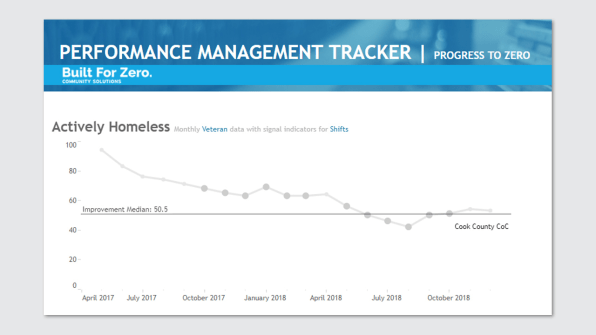Excerpt below. Read full article at Fast Company
Nine more have ended veteran homelessness. It’s part of a national program called Built for Zero that uses a data-based approach to help officials figure out exactly who needs what services. Now it’s accelerating its work in 50 more cities.
“By ending homelessness, we mean getting to a place where it’s rare, brief, and it gets solved correctly and quickly when it does happen,” says Rosanne Haggerty, president of Community Solutions, the nonprofit that leads the Built for Zero program. “That’s a completely achievable end state, we now see.” The nonprofit, which calls this goal “functional zero,” announced today that it is accelerating its work in 50 communities.

One key to the process is data, and a visual dashboard that lets agencies track people experiencing homelessness in real time. In Abilene, with a population a little more than 120,000, for example, the city located every homeless veteran, gathered information about each individual situation, and stored this information in a “by-name list” that was continually updated. “It basically just forced us to continuously look to change improvements to our system, and how to use real-time data to improve our performance,” says John Meier, the program manager for supportive services for veteran families for the West Central Texas Regional Foundation. “We’ve always had lots of data sitting around, but haven’t had it in one place and [haven’t been] utilizing it to our advantage.” Every agency in the city began working together and meeting to discuss how to get each veteran–21 people, as of February 2018–into housing. While watching the data, they could test interventions like working with local landlords and the public housing agency to prioritize people on the list. The average amount of time to house a veteran shrank from more than 40 days to 26. By November 2018, 10 months after joining the Built for Zero program, Abilene had reached the goal of “functional zero” for veteran homelessness. (It made the announcement in February in part because it was waiting for federal confirmation, which was delayed by the government shutdown.)